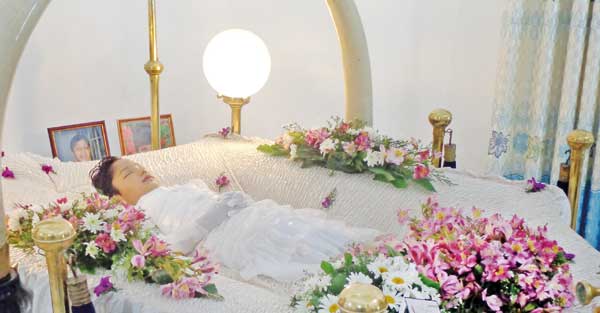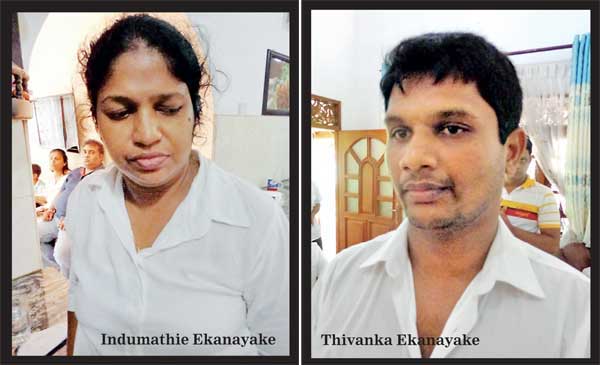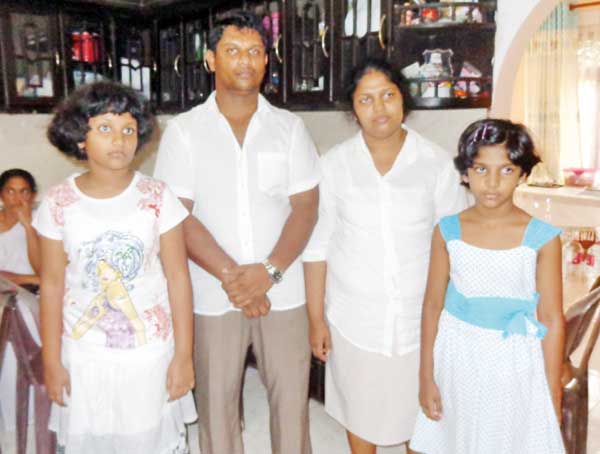Reply To:
Name - Reply Comment
Last Updated : 2024-04-27 00:40:00

.jpg)
.jpg) “My little girl who walked into the MRI scanner room with her usual mischievous smile returned in an unrecognizable state. By the time she was taken out of the MRI scanner bed her whole body had turned blue, the limbs had stiffened and her stomach was swollen like a balloon” says Indumathie Ekanayake as she relates the details of what she believes were the final moments of her daughter’s life.
“My little girl who walked into the MRI scanner room with her usual mischievous smile returned in an unrecognizable state. By the time she was taken out of the MRI scanner bed her whole body had turned blue, the limbs had stiffened and her stomach was swollen like a balloon” says Indumathie Ekanayake as she relates the details of what she believes were the final moments of her daughter’s life.
.jpg) |
|
Dr Prathiba Mahanamahewa, Commissioner of the Human Rights Commission pointed out that the hospital in which the deceased child was treated in could be held vicariously liable. If there was negligence on the part of an employee, instrument, machine or anything that belongs to the hospital the hospital authorities have to be responsible and could be held vicariously liable according to Dr. Mahanamhewa. He said legal remedies were available in such a case to sue hospital authorities under product liability if a machine or an instrument of the hospital was the cause of death. He also said legal remedies were available through medical negligence and service liability if it was the negligence of the doctors or the technicians. “This is a life we are talking about and the responsible parties should be brought before the law. The parents have been psychologically affected. Even though laws regarding the regulation of private hospitals had not developed that much under Common Law such negligence could be brought to justice. The Law of Delict in Sri Lanka is enough to take action against medical negligence. This will also be a violation of the Children’s Rights Convention as well” he said. He emphasized that since this case concerned a minor, the National Child Protection Authority should come forward to do an investigation of the incident. “If the police investigations reveal that it is a criminal offence, the responsible parties would face charges for the violation of the Penal Code as well” he said. |
.jpg) |
|
Sri Lanka Medical Council (SLMC) Registrar Dr. Nihal Nonis says although they are not provisioned to take action against institutions, they are able to take action if complaints are filed against individuals who violate the standards of the medical profession. “We have methods of investigating and probing into individuals if an official complaint is lodged with the SLMC. Accordingly relevant action can be taken against those accused ranging from issuing warnings, suspending their practice as well as terminating their registrations,” he added. Meanwhile, the national body for regulating private sector health services – the Private Health Regulatory Council (PHSRC) said it was advisable for those who visited private sector health service institutions to make sure the establishments were registered with the Council before going for treatment. PHSRC Secretary Dr. Kanthi Ariyarathne speaking to Daily Mirror said the private sector health practices should also display the registered certificate in an area where it is visible to the visitors. “Under the Private Medical Institutions (Registration) Act No 21 of 200, registering with the PHRSC guarantees that our regulatory mechanism will ensure the standards of the private sector health service establishments are maintained with concern for human resources and equipment. We have set out 11 categories and each category has various guidelines they should be adhering to and if any of these are violated there is a series of actions that can be taken against these institutions that have been provisioned to us by law” she added. However, she also mentioned that if an offence was committed, the establishment is provided with a reasonable period of time to rectify their errors. However, if they continued to ignore the regulations, she said legal action could be taken even to the extent of closing down the establishment. “But it is important for the public also to realize that this is a gradual process and this is a service sector and we need to observe the crises from a practical point of view,” she said. |
.jpg) |
|
A spokesperson for the Nawaloka Hospitals who wished to remain anonymous categorically denied all allegations held against them by demised Kaushalya’s parents. He said the MRI machine functioned perfectly well and added they had carried out several other scans in the machine even after the alleged incident. “The girl undergoing treatment for Rhett syndrome, which is a neurological issue, is incurable in spite of medical treatment. We deny their allegations because it has been made clear she died due to cardiac arrest and not of an accident that occurred within the MRI scanner. She was receiving treatment in the SICU for six days subsequent to her MRI scan and our staff attempted their level best to ensure that she was resuscitated,” he said. |
_DM-recast-9(3).jpg) |
|
A spokesperson for the Peoples Movement for the Rights of Patients (PMRP) said that such tragedies occur mainly because of the lack of implementation of laws relating to the regulation and monitoring of private hospitals. The spokesperson went on to point out that even though laws had been passed the implementation was woefully ineffective and most private hospitals were acting in an unacceptable manner. “It is the super rich who can afford to undergo treatment at private hospitals. They give many tests sometimes which are not even necessary and the hospital bills cannot be afforded by everybody” he said. He also mentioned that though there was a Director appointed by the Health Ministry to look in to the regulation and monitoring of private hospitals, this type of incidents continue to occur. “There is no national drug policy or a national health care policy. As a result private hospital consultants are making multi millions and they make them at the expense of innocent unsuspecting patients. When private practice was established in 1969 the fee paid to the doctor and the hospital was at a 4-1 ratio but even that ratio is not taken into consideration and not even the fee charged by the private hospitals is regulated” he claimed. He added that the government should take immediate steps to restore the health service in a state where the patients’ rights are given top priority as it is a matter of life and death. |
 |
.jpg) |
.jpg) |
| Little Kaushalya receiving treatment in the SICU |
 |
| Kaushalya’s parents and sisters |
.jpg) |
.jpg) |
Vijay Jayaekera Friday, 15 February 2013 09:25 AM
I have been informed that Nawaloka Hospital pays an incentive to medical Doctors to recommend them for MRI scans and various tests etc.
Can whatever Government body inquire into this and see whether it is true.
If it is true the Doctors and Directors of Nawaloka should be held personally liable for profiting from these actions.
M.S. Hassen Friday, 15 February 2013 03:14 PM
Punish those responsible immediately.
Do not waste time..
S Indralatha Saturday, 16 February 2013 10:32 AM
This clearly a case of medical negligence partly by the anaesthetist and the hospital. Anaesthetist has not checked the equipment as she should do before any procedure and proper resuscitation equipment and emergency team was not available to resuscitate the little girl.
In Srilanka no body will held responsible for this sort of problem. Hospital should be fined at least 50-100 million ruppes, and should be instructed to have proper policy when anaesthetizing anybody not only children including having a emergency resuscitation team and Dr who was responsible for her care(Anaesthestit) should be suspended from furthre practice for negligence.

Add comment
Comments will be edited (grammar, spelling and slang) and authorized at the discretion of Daily Mirror online. The website also has the right not to publish selected comments.
Reply To:
Name - Reply Comment
US authorities are currently reviewing the manifest of every cargo aboard MV
On March 26, a couple arriving from Thailand was arrested with 88 live animal
According to villagers from Naula-Moragolla out of 105 families 80 can afford
Is the situation in Sri Lanka so grim that locals harbour hope that they coul

7 hours ago
9 hours ago